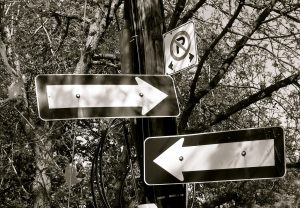 English can be a confusing language in many different ways, with words that are spelled the same but pronounced differently (like “lead” the element and “lead” the verb) and words that are pronounced the same but spelled differently (like “threw” and “through”). But one extra layer of confusion comes from auto-antonyms, also known as Janus words or contronyms. An auto-antonym, also sometimes called a self-antonym, is a word that means two opposite things at the same time. The English language contains a surprisingly large number of words that have opposite meanings, which can largely be attributed to the ever-shifting nature of words and their definitions. Can’t think of an auto-antonym off the top of your head? You’d be surprised how many words with opposite meanings you use every day without even noticing it. Make sure that if you’re using these words in your writing, it’s very clear which definition you mean!
English can be a confusing language in many different ways, with words that are spelled the same but pronounced differently (like “lead” the element and “lead” the verb) and words that are pronounced the same but spelled differently (like “threw” and “through”). But one extra layer of confusion comes from auto-antonyms, also known as Janus words or contronyms. An auto-antonym, also sometimes called a self-antonym, is a word that means two opposite things at the same time. The English language contains a surprisingly large number of words that have opposite meanings, which can largely be attributed to the ever-shifting nature of words and their definitions. Can’t think of an auto-antonym off the top of your head? You’d be surprised how many words with opposite meanings you use every day without even noticing it. Make sure that if you’re using these words in your writing, it’s very clear which definition you mean!
- Bolt: You can bolt something down, which means that you’re securing it so it doesn’t move at all, or you can bolt toward the finish line, moving very quickly.
- Buckle: If you buckle a seat belt, you’re connecting two things, but if asphalt buckles, it’s breaking apart.
- Cleave: A married person should cleave to their spouse, which means that they should stick by them. But if you use an ax to cleave firewood, you’re splitting it apart.
- Clip: A pair of scissors is used to clip your hair at the salon, taking hair away. But you can also use a paper clip to clip together papers, adding them into one bundle.
- Dust: Housekeepers will dust a table to remove dust from a surface, while detectives will dust for fingerprints, which means that they’re adding dust to a surface.
- Enjoin: It’s really hard to tell what you want if you enjoin someone to do something. It might mean that you’re pleading with them to do it, but it might also mean that you’re forbidding them from doing it.
- Fast: Runners want to be fast if it means “quick,” but they don’t want to be fast if it means “stuck in place.”
- Fine: For a fancy dinner, pull out the fine china, the best dishes you have. But for a casual lunch, paper plates are fine, good enough.
- Finished: It’s a good thing when a project is finished (completed), but if someone’s career or reputation is finished, it’s been destroyed.
- Handicap: Though the word is falling out of favor in this sense, a handicap is still often taken to mean a disadvantage or disability. But if you’re playing golf, for instance, you might be given a handicap, which is an advantage that puts you ahead from the start.

Photo by Kyle MacKenzie (Flickr)
- Inflammable: The funny thing about this word is that it took on an opposite meaning simply because people kept misinterpreting it. It comes from the verb “inflame,” to cause to burn (literally or figuratively), so something that’s inflammable is inflame-able, able to be burned. But since the prefix “in-” often indicates a negative, enough people read this word as in-flammable, not flammable, that this is the presumed meaning nowadays. The word “flammable” was actually invented later, and it’s more frequently used to mean “burnable.”
- Left: If you left to go to the circus, you’re the lucky one who went somewhere fun. If you were left behind, you missed out.
- Off: When your alarm goes off in the morning, it turns on. Then, you turn it off.
- Oversight: A manager’s oversight (close attention and supervision) can avoid an unfortunate oversight (a mistake or omission made because someone wasn’t paying attention).
- Refrain: In music, a refrain is something that’s repeated; in most other uses, if someone tells you to refrain, that means to not do something at all.
- Rent: If you’re renting an apartment, you might be paying someone to use their space, or someone else might be paying you to use yours.
- Sanctioned: Something that’s sanctioned has official permission or authorization, but if you impose sanctions, they’re penalties.
- Seed: If you seed a field, you’re adding seeds. If you seed a cucumber, you’re removing them.
- Strike: When baseball players get a strike, they failed to hit the ball, but more often, if you strike something, you did hit it.
- Trim: Trimming a tree means two things at Christmastime; either you’re cutting away parts of the branches (if you have a real tree rather than an artificial one), or you’re adding decorations to them.
Can you think of any other words that mean their opposite? If so, we’d love to hear them: Leave us a comment!

How about cool? To cool something off, meaning to bring the temperature down, and then if a person is cool, they are considered “hot”.
It’s the only one I could come up with on a whim. I’ll definitely give this “word game” a lot more thought.